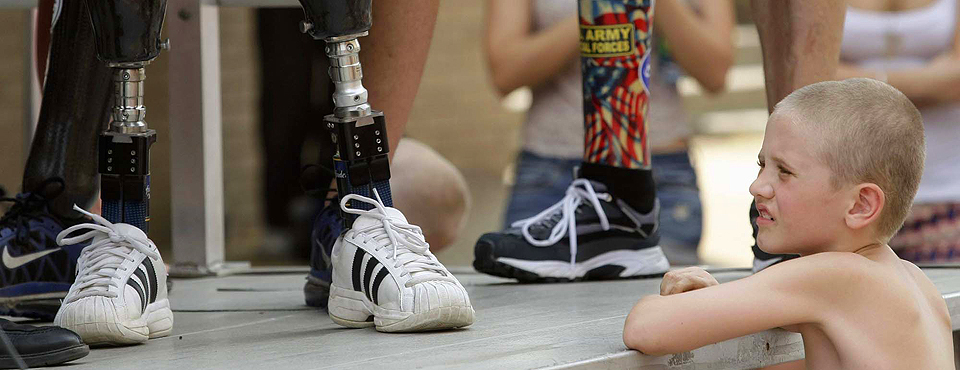Funded Research Projects
A key objective of the Consortium is to conduct innovative, high-impact and clinically relevant BADER-funded research studies that lead to sustainable, externally funded research programs.

BADER Consortium currently is funding eight clinical research projects totaling $7.7 million. They are projected to enroll more than 1,500 wounded armed service members by their completion.
They are:
STEP2STEP
Goal: Improve the dynamic walking stability in traumatic lower-limb amputees.
Researchers are working to develop and evaluate the effectiveness of a virtual reality-based training intervention to improve step-to-step control of walking in patients with lower-limb amputations.
Study Team:
Jonathan Dingwell, PhD,
Associate Professor, University of Texas Austin
Jason M. Wilken, PhD;
Director, Military Performance Lab,
Center for the Intrepid, Brooke Army Medical Center
RETRAIN
Goal: Help subjects return to a high level of performance through walk-to-run training with real-time kinetic feedback.
Study Team:
Irene Davis, PhD,
Director of Spaulding National Running Center
Alison Pruziner, DPT,
Walter Reed National Military Medical Center
Amanda Wingate
Steve Jamison
Matthew Ruder
Trauma Outcomes
Goal: Researchers are conducting a qualitative study of patient-reported outcomes measures in people with major limb trauma. The aim is to benchmark current outcomes care levels for orthopaedic rehabilitation.
Study Team:
David Tulsky, PhD,
Director, University of Delaware Center for Assessment Research and Translation
Marilynn Wyatt, MPT,
Director of the Gait Analysis Laboratory,
Naval Medical Center, San Diego
Jason Wilken, PhD,
Director, Military Performance Lab,
Center for the Intrepid, Brooke Army Medical Center
K2 Power
Goal: Identify differences in gait, efficiency, function and quality of life between using a standard passive prosthesis versus a powered BiOM ankle prosthesis. This study focuses on the sustainable benefits for lower-limb amputees who have been identified as K2 and K3.
Study Team:
Alison Pruziner, DPT,
Walter Reed National Military Medical Center
David Tulsky, PhD,
Director, University of Delaware Center for Assessment Research and Translation
Joseph Webster, MD,
Medical Director, VHA Amputation System of Care
Erik Wolf, PhD,
Walter Reed National Military Medical Center
ProLegRx
Goal: Seek a science-based method for prescribing running-specific leg prosthesis for soldiers and veterans with transtibial amputations to optimize sprinting and running performance.
Researchers are investigating the optimal stiffness and height of a running-specific prosthesis, using about 40 prostheses in use on a high-speed force treadmill.
Study Team:
Alena Grabowski, PhD,
University of Colorado Boulder Applied Biomechanics Lab
Rodger Kram, PhD,
University of Colorado Boulder Locomotion Laboratory
MORE (Maximizing Outpatient Rehabilitation Effectiveness)
Goal: Assess rehabilitation outcomes in the clinical environment to support evidence-based practice in military treatment facilities.
Study Team:
Jason Wilken, PhD;
Director, Military Performance Lab,
Center for the Intrepid, Brooke Army Medical Center
David Tulsky, PhD;
Director, University of Delaware Center for Assessment Research and Translation
Col. Scott Schaeffer, PhD, PT
Lt Col. Kevin Houck, DPT, PT
Maj. Owen Hill, PhD
Outcomes Toolbox
Goal: This project aims to develop a toolbox of outcomes measures to serve as a common data elements across research studies and clinical evaluations. Researchers are studying community reintegration, functional outcomes and quality of life after a major extremity trauma.
Ruck Foot
Goal: Determine the criteria for evaluating and prescribing prosthetic ankle-foot components for service members with amputations who wish to take part in physically demanding tasks.
Study Team:
Barri L. Schnall, MPT
Andrew Hansen, PhD
Bradford Hendershot, PhD
Joan Bechtold, PhD
